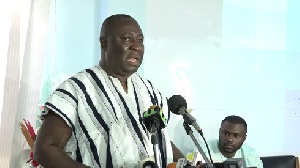 Director of Public Health Division of the Ghana Health Service, Dr. Badu Sarkodie
Director of Public Health Division of the Ghana Health Service, Dr. Badu Sarkodie
The Ghana Health Service says the cargo disinfection exercise at the various entry points of the country is to protect the country against the outbreak of diseases.
According to the Director of Public Health Division of the Ghana Health Service, Dr. Badu Sarkodie, vessels move from one port country to another picking several infections and pathogens on the sea, hence, the need to have the containers disinfected once they reach the country’s ports.
“The Ghana Health Service realized there is the need for the disinfection of the various cargoes that would be coming into the country. Disinfection meaning that should the cargo be contaminated, there should be a mechanism to remove this contamination,” Dr. Badu Sarkodie said.
So far, disinfecting tunnels have been erected at the Port of Tema to disinfect import and export cargoes.
Addressing a press conference following the suspension of the fumigation levy by government, the Director of Public Health Division of the Ghana Health Service said the disinfection policy is part of the International Health Regulation (IHR) that enjoins countries to decontaminate imports and exports as a laid down bio-security measure.
He stated that the International Health Regulation which has the mandate and scope is to ensure that there is a minimized or reduced international spread of disease conditions or prevention of it.
“Doing that also we must ensure this does not affect trade,” he averred.
He said his outfit welcomes the suspension of the fumigation levy by government for broader consultation to take place but added that the confirmed cases of lasser fever in the West African continent must be a wakeup call for Ghana to put in place measures to avert the outbreak of diseases.
“We are faced with Lasser fever outbreak in Nigeria and other countries in the sub-region such as Niger, Togo and recently Ghana also has confirmed cases. So, it is prudent that every country puts in a mechanism to prevent and protect against these biohazards,” he advised.
The Director of Crisis Management and Prevention Company, LCB World Wide, Abdul Kareem Abu who constructed the tunnels refuted claims that the location of the tunnels are creating congestion in the Port.
“As we currently stand here today, we have run series of pilot programs in all the tunnels and the positions that we put them in have actually improved the flow of traffic at the port,” he said.